AN OPERATIC DEATH IN VENICE
A storm blackens the skies, casting a shadow on the land. The citizens and soldiers of Venice sway with anticipation, waiting for their mighty general to triumphantly return. In the center of an impressive, multi-tiered wartime display embellished with cannons, hangs Jesus Christ on a crucifix, his light shrouded by military darkness. So powerful are these first visuals of the Metropolitan Opera’s production of composer Giuseppe Verdi and librettist Arrigo Boito’s Otello that they linger in your mind, not just because the scene is grand, but because they acutely frame and foreshadow the theme of Shakespeare’s tragedy: Purity and innocence obscured by evil.
Sauntering onto the stage in all his glory is the unwitting pawn of all that is dishonorable: Otello. Played in black-face by the unconquerable tenor, José Cura, Otello’s commanding presence is immediately established, as it should be. His authority, his power, and the respect that he garners are all the more remarkable when pitted against his tenderness towards and worship of his new bride, Desdemona, played by soprano Krassimira Stoyanova. One rough, the other soft, one dark-skinned, the other fair, theirs is a match that theoretically doesn’t make sense, but when Cura and Stoyanova are alone together on stage, there is undeniable magic and almost relentless affection. Almost.
All seems to be well in Venice. Otello has defeated the invading Turks, and he is celebrating his wedding night with his beloved. Despite the challenges associated with his skin tone (something that takes a back seat in this production), Otello is on top of the world. That is, except for being hated by and conspired against by his ensign, Iago (wily tenor Thomas Hampson). In a devilishly systematic way, Hampson completely embraces the role of the villain who sets out to destroy his boss from the very beginning – his biggest professed reason being that he believes he was created by God to be sinful and is just playing out his part. Like a game of chess, Iago works quickly to use and abuse everyone that will suit his purpose, including Roderigo (Eduardo Valdes), a wealthy fop in love with Desdemona and Cassio (Alexey Dolgov), an officer that was just promoted over Iago. Planting a seed of suspicion of infidelity on Desdemona’s part, Iago uses everything in his power to beguile his unsuspecting victims. Unfortunately, Otello stands to lose the most out of all: Faith and trust in his most cherished Desdemona.
Nothing, not vicious foe or the strategy of the enemy, undoes Otello more than the thought that his wife is cheating on him and making a cuckold out of him. Cura writhes, sobs, and feels acute pain as each false piece of evidence against Desdemona is brought before him. Under the direction of David Kneuss, that underpinning is spot-on in intimate scenes but lacking in larger, ensemble ones. Cura’s anguish is always compelling, and even more forceful by the passion between Otello and Desdemona, but that intensity dissipates as soon as Iago begins his web of deceit. As Desdemona, Stoyanova plays the loyal and gentle lamb well, confused and mystified by her husband’s accusations, but never once responds in anger or bitterness, even as she repeatedly invites Otello to evaluate her actions and test her virtue, much as she did on their wedding night. Although the singers are emotionally on different planes, there is still a sense of the combination of irrationality and extremes on both characters’ parts, driven by completely different reasons, which makes the destruction of their relationship so heart-breaking, beautiful, and for the soft-hearted, tear-inducing.
Michael Yeargan’s set design, with the exception of some trees that look too fake, is full of Venetian charm and elegance, and each scene is more sumptuous than the next. At the beginning of each of Otello’s four acts, Yeargan dazzles us with the interiors and exteriors of a castle that befit a queen, which is apropos for the tale. For even though Desdemona is a governor’s wife, she has the same virtue as Mary, the queen of heaven, to whom she offers her earnest prayers and submission. With a lavish set, moving vocal performances, and a classic tragedy that’s sure to resonate with many, Otello reigns as one of the jewels in the crown of the Metropolitan Opera’s current season.
photos by Ken Howard/Metropolitan Opera
Otello
Metropolitan Opera
scheduled to end on March 30, 2013
for tickets, call 212-362-6000 or visit http://www.metoperafamily.org
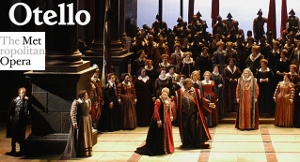
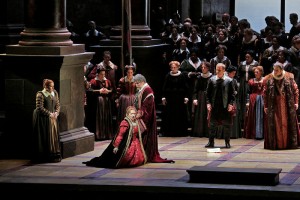
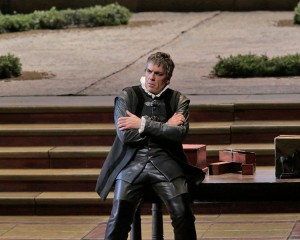
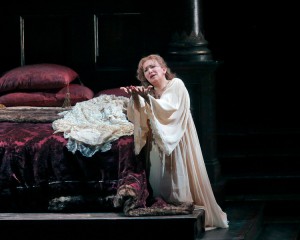
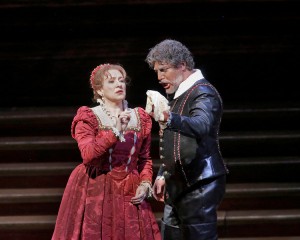
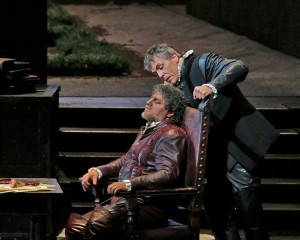

{ 1 comment… read it below or add one }
Just saw this production. Krassimira Stoyanova was superb. Highly recommended.